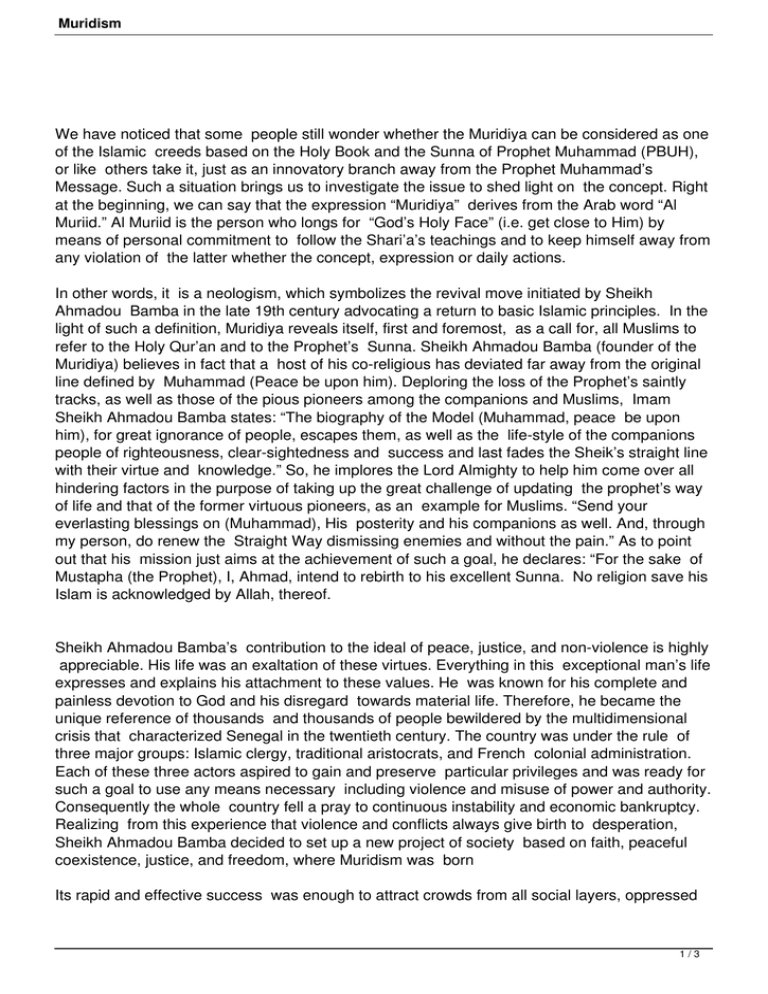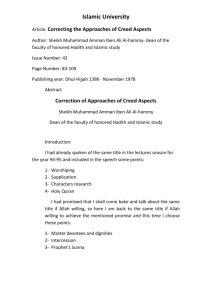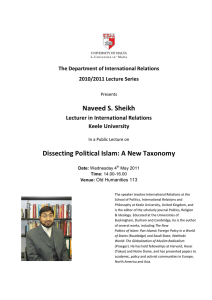We have noticed that some people still wonder whether the Muridiya
advertisement

Muridism We have noticed that some people still wonder whether the Muridiya can be considered as one of the Islamic creeds based on the Holy Book and the Sunna of Prophet Muhammad (PBUH), or like others take it, just as an innovatory branch away from the Prophet Muhammad’s Message. Such a situation brings us to investigate the issue to shed light on the concept. Right at the beginning, we can say that the expression “Muridiya” derives from the Arab word “Al Muriid.” Al Muriid is the person who longs for “God’s Holy Face” (i.e. get close to Him) by means of personal commitment to follow the Shari’a’s teachings and to keep himself away from any violation of the latter whether the concept, expression or daily actions. In other words, it is a neologism, which symbolizes the revival move initiated by Sheikh Ahmadou Bamba in the late 19th century advocating a return to basic Islamic principles. In the light of such a definition, Muridiya reveals itself, first and foremost, as a call for, all Muslims to refer to the Holy Qur’an and to the Prophet’s Sunna. Sheikh Ahmadou Bamba (founder of the Muridiya) believes in fact that a host of his co-religious has deviated far away from the original line defined by Muhammad (Peace be upon him). Deploring the loss of the Prophet’s saintly tracks, as well as those of the pious pioneers among the companions and Muslims, Imam Sheikh Ahmadou Bamba states: “The biography of the Model (Muhammad, peace be upon him), for great ignorance of people, escapes them, as well as the life-style of the companions people of righteousness, clear-sightedness and success and last fades the Sheik’s straight line with their virtue and knowledge.” So, he implores the Lord Almighty to help him come over all hindering factors in the purpose of taking up the great challenge of updating the prophet’s way of life and that of the former virtuous pioneers, as an example for Muslims. “Send your everlasting blessings on (Muhammad), His posterity and his companions as well. And, through my person, do renew the Straight Way dismissing enemies and without the pain.” As to point out that his mission just aims at the achievement of such a goal, he declares: “For the sake of Mustapha (the Prophet), I, Ahmad, intend to rebirth to his excellent Sunna. No religion save his Islam is acknowledged by Allah, thereof. Sheikh Ahmadou Bamba’s contribution to the ideal of peace, justice, and non-violence is highly appreciable. His life was an exaltation of these virtues. Everything in this exceptional man’s life expresses and explains his attachment to these values. He was known for his complete and painless devotion to God and his disregard towards material life. Therefore, he became the unique reference of thousands and thousands of people bewildered by the multidimensional crisis that characterized Senegal in the twentieth century. The country was under the rule of three major groups: Islamic clergy, traditional aristocrats, and French colonial administration. Each of these three actors aspired to gain and preserve particular privileges and was ready for such a goal to use any means necessary including violence and misuse of power and authority. Consequently the whole country fell a pray to continuous instability and economic bankruptcy. Realizing from this experience that violence and conflicts always give birth to desperation, Sheikh Ahmadou Bamba decided to set up a new project of society based on faith, peaceful coexistence, justice, and freedom, where Muridism was born Its rapid and effective success was enough to attract crowds from all social layers, oppressed 1/3 Muridism citizens as well as former warriors in search of a new protecting wing. It therefore became the main source of anxiety for local French authorities. To sum up the history, let us remember that Sheikh Ahmadou Bamba was arrested in 1895, unfairly sentenced, jailed and exiled to Gabon where he spent more than seven years subjected to the most ill treatment one can ever imagine, whilst his family, relatives, and disciples were undergoing the same kinds of arrests, straight tortures, and oppression. Such a situation naturally would fully justify defensive action. Sheikh Ahmadou Bamba instead was convinced that the solution was in Islam and its virtues of peace, tolerance, and non-violence with the preservation of one’s dignity. "War will only create death and destruction, which are loss for Islam. So God, I am asking you to let me renovate Islam in a way that will protect people so that they can be safe, and that nothing that will be destructive to the society.(O My Lord) revive the Message (of Islam) throughout my person without any adversity or pain,” he expressed as a prayer to God showing his will to establish an Islamic society based on peace and concord. To achieve his ambition he was aware of the necessity to expend a lot of effort, to fight. But his struggle was not a Jihad under the form of an armed resistance against injustice. “I make Jihad (particular effort for the safeguard of the religion) by means of knowledge (Instruction) and godliness, remaining exclusively the slave of God and server of the Prophet (peace be upon him) and my Lord witnesses,” he declared to shed light on the controversy about his possible preparation for saintly war. To set definitely people’s mind at rest he claimed in his usual style of prayer addressing to God: “By consideration for him (Muhammad) preserve us until (we go to) paradise against the necessity to make war and against dishonor By consideration for him (the Prophet pbuh) pacify the times for us and please accept our service.” His Jihad is through teaching and compiling all the science that can be useful to human kind. The second Jihad is to show people the right way to behave among one another which is to teach people to respect one another and the laws established by God on earth. As such, he also conveiled to his followers to use this simple line of conduct to be non violent as well. “Who ever wants to have a peaceful mind and a comfortable life you have to have four things: 1- Always wish in your heart good things for people 2- Always what ever you say should be things that will not harm people 3- Always what ever you act upon should be things that does not harm people 4- Always do not be in the company of people that harm people. “And fear 'fitnah' (affliction and trial, etc.) which affects not only those of you who do wrong (it may afflict all the good and the bad people), and know that Allah is Severe in punishment”). (Qur'an 8:25) The aspiration was something permanent for him since he knew that only with peace and harmony man can achieve something durable on earth. “Turn the enemies' mind to my favor preserving them against any sorrow on my behalf. Through my example guide adults as well as the youth,” he stated as a prayer. If need would be again, the upright attitude and behavior of Murids during the exile of Sheikh Ahmadou Bamba when they were subjected to oppression (harvests injuries to them, their houses looted, etc) would be enough to illustrate the pacifism of Muridism. In spite of their considerable number and their extreme love and devotion to Sheikh Ahmadou Bamba, the Murids never reacted to the ill treatment they were undergoing and to the injustice their leader was submitted to. Not even the smallest upheaval or demonstration has ever been reported against them. their exemplary respect of the discipline of group places Muridism as a universal model for peaceful coexistence as wall as public security and order. He prays for Allah to change their heart (the enemies) to be his allies "because most likely they do not know that I am only working for the good of humanity. And at the same time please protect them for any arm that may come from me or from my follower. Please save them and other of their elder and 2/3 Muridism youngster." "To be in peace with your neighbor, you should not provoke him, do not have hatred towards him, do not under estimate or ignore him or think that you are better than him (Do not have a superior complex)." When he came back from his trip, he was asked if he was mad at the colonial authorities, he said that he forgave them all their deeds, for the sake of God even though they mistreated him and took part of his life. Satan, who is the number one enemy of people, comes to them in different forms: - Through discussions that become over heated. In that case ,to extinguish this fire that is raging in your heart, use silence as your extinguisher, - Discussions that become nasty, you should shake one another's hands, - If some one does not like you, whenever you see him make him feel like he is your brother or sister and put him at ease. These teachings are being applied by the followers and to showcase that we will bring you two examples: - The first followers of the Sheikh suffered a lot in many forms of violence. But they never reposted - After his exile, they heard that the sheikh was suffering. However, they did not repost. Even though they were hurt within and were living with the enemy. History did not write any event of the followers reposting. In conclusion, Sheikh Ahmadou Bamba is not even comparable to other leaders of non-violence, because those leaders either started with violence, or did not start with violence but when attacked reposted, or one did not do any of these but their followers could not support the treatment and reposted. Muridism and violence - Did not repost to provocation - Did not start with violence - His followers did not repost to provocation neither. He asked to be a renovator of Islam and wanted to work for Allah alone. He opted to direct his Jihad towards the heart and the mind. The Sheikh believed that one could fight against oppression without violence, but through the use of science and knowledge. For him violence would cause death and destruction which will stop development. Islam to show that it does not favor extremism, God said to the Prophet: “you do not have to impose religion on the people.” In conclusion, we can see that the notion of peace and non-violence turns out to be a resource as well as a goal in Sheikh Ahmadou Bamba’s project of good peaceful society. He announces by himself the success he has met with such a strategy as follows: “He (reffering to himself) has successfully revalorized the religion (Islam) and clarified the Straight and Narrow, taking away every thing that may cause damages.” To conclude the statement of his success in his mission he adds, “The Lord helped me and the creatures that followed me on dry land as well as on sea for I am useful to them without any harm.” In short, Sheikh Ahmadou Bamba distinguished himself by a constant and exceptional humanism characterized by two principles: to find out an excuse for any human mistake in any case and to consider in his interaction with other human beings the Right and Majesty of the Creator (God) who deserves respect. His non-violence was neither an occasional strategy nor a political pet theme. That was a virtue, a feeling that grew deep from his heart. 3/3


